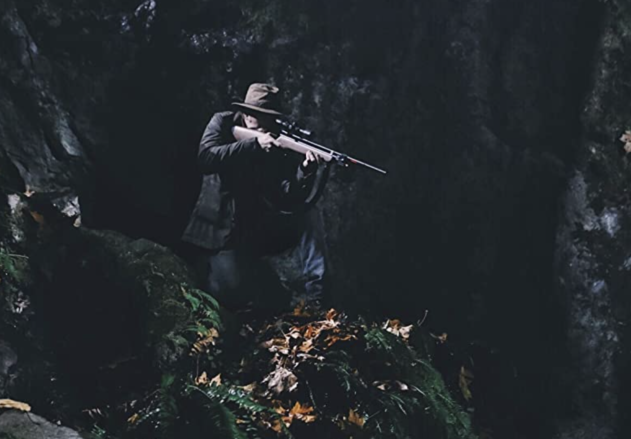Director John Hyams achieves genre perfection with his new film “Alone” (REVIEW)
Just so we’re clear, I have never cared for man-against-the-wilderness type films ( “Dersu Uzala,” Joe Carnahan’s “The Grey,” and “The Revenant” being exceptions) and I dislike kidnap films, as well.
No matter how well-made, this type of film falls prey to unavoidable cliché. In film after film we witness the long fall off an unexpected cliff into the icy water or the tree branch going through the protagonist’s skin, making it tougher to survive. In films where someone is kidnapped, we must sit through the first few scenes where the kidnapper comes into the room without saying why this is happening to the victim and later we will watch moments where said victim surveys their situation, planning their escape, and almost succeeding until they hear their captor return.
The new thriller directed by John Hyams is both woman-against-the-wilderness and kidnap film. While it does contain a few banalities (turning a couple of them on their heads and skirting expectations, too), Hyams has crafted an entertaining works that will [cliché alert] keep the viewer on the edge of their seats for the ninety-minute running time of the film.
Jules Willcox gives a poignant performance as Jessica, a recent widow knocked down by grief. Grappling with her husband’s death and wanting to pick up the pieces, she has packed up her belongings and is leaving Portland to return to her hometown.
On the beautiful highways of the Pacific Northwest Jessica’s car snakes its way through the near empty roads, her truck and U-Haul trailer cutting a lonely path through the land, enhancing her isolation both internal and external. From only a phone call to her father and a few sorrowful close-ups, we feel the tremendous impact of her loss.
Hyams pays homage to the “The Shining” by using gods-eye views of Jessica’s lone car snaking down the winding roads and title cards that thunder onto the screen.
After a while, Jessica becomes stuck behind a slow-moving black SUV. Her determination to distance herself from the now tragedy-colored city that is miles behind leads to frustration and she goes around the truck. As a semi comes barreling towards her, the SUV refuses to slow down and let her pass. Danger is imminent and the specter of death lets her know that she is not yet free from its grasp.
The dark SUV will keep turning up but this is not a mere a rehash of Spielberg’s “Duel.”
In a clever storytelling choice, the SUV’s driver (Marc Menchaca, an actor who is carving out quite an impressive career for himself) is revealed not long after that first road incident. He cautiously comes up to her window and lets her know he is the driver of the SUV. Immediately he apologizes, claiming he was texting and didn’t see her until it was too late. A bit reluctantly, Jessica accepts his apology. Wishing her well, the driver walks back to his truck and into the night.
It is on the highway where Jessica sees the SUV a bit later. And again later. Now an ominous game of cat and mouse begins until a flat tire leaves her helpless. The headlights of the oncoming come toward her. It is the SUV. The driver gets inside her car and takes her. This is not a spoiler, as we know what the film is about.
Jessica wakes up in an empty basement and soon the driver of the SUV comes into the room. Our heroine is now a confirmed kidnap victim and the helplessness immediately sets in. Hyams thankfully shows no interest in exploitation and does not wish to dwell on Jessica’s torment. It is not long at all before she is searching the room, looking for anything that will aid in her escape. And escape she does! Again, this is no spoiler. The audience understands the crux of the film is Jessica’s fight for survival in the wooded terrain as a psychopath hunts her down.
The screenplay is by Mattias Olsson, who wrote and directed the original Swedish version “Forsevunnen” (“Gone”). Strangely, that film does not work as well as “Alone.” While essentially being the same story, Olsson’s original film failed to reach the desirable tension.
John Hyams proves himself to be a competent craftsman and the right filmmaker to elevate the material beyond the trappings of its genre.
One of the smartest touches is to downplay the presentation of its villain. Menchaca doesn’t go over-the-top. His presence is sinister, but his demeanor calm and almost nerd-like behind his oversized glasses, unkempt hair and handlebar mustache. The actor is quite chilling—by not showing us anything. The only time we see him get riled is when she escapes and even then, he sidesteps maniacal histrionics. It is a well-done character and an exceptionally good performance from an actor to watch.
Cinematographer Federico Verardi shows the gorgeous landscapes of the Pacific Northwest while also achieving an atmosphere that’s menacing. For Jessica, the winding roads and pounding rivers are deceptive in their beauty and present little comfort.
John Hyams is the son of director Peter Hyams and like his father doing his own cinematography, Son John does his own editing (with Scott Roon) on this film. Hyams and Roon’s work keep the film moving at a sharp pace. Hyams refuses to allow a moment’s rest for his audience, creating each scene to be more gripping than the last. This is an expertly-designed film in every moment and the skill of Hyams and his crew is used to great effect.
Any great thriller needs a relatable and believable protagonist. In Jessica, an already well-crafted character, Jules Willcox creates a heroine the audience can relate to and one who refuses to be victim for too long. Jessica fights back against her depression, her attacker, and finally the elements. Mentally and physically she is a woman under attack and must overcome all if she wishes to survive.
Wilcox is in every scene and makes the most of it. This is not the by the book performance that is all hysterical screaming and crying seen in so many similar films. Jules Willcox is more skilled than that and shows herself up to the task, bringing about a character who finds her will and courage to go forward and keep distance from the darkness behind her. At times, her plight becomes metaphor for the horrific memory of her husband’s death and her desire to overcome it. It is a smart performance in an equally smart film.
An official selection at the 2020 Fantasia International Film Festival, “Alone” is a gimmick-free and very well-directed genre film that’s filled with smartly-crafted tension and two fantastic lead performances.
This is a heart-pounding thriller that works completely.
news via inbox
Nulla turp dis cursus. Integer liberos euismod pretium faucibua




